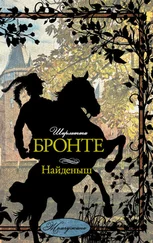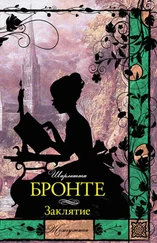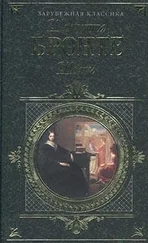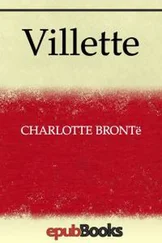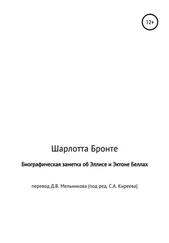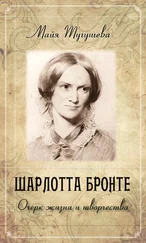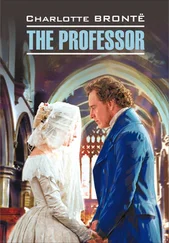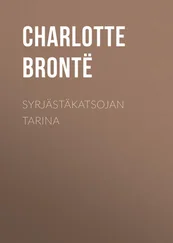Шарлотта Бронте - The Professor
Здесь есть возможность читать онлайн «Шарлотта Бронте - The Professor» — ознакомительный отрывок электронной книги совершенно бесплатно, а после прочтения отрывка купить полную версию. В некоторых случаях можно слушать аудио, скачать через торрент в формате fb2 и присутствует краткое содержание. Год выпуска: 2014, Издательство: epubBooks Classics, Жанр: Классическая проза, на английском языке. Описание произведения, (предисловие) а так же отзывы посетителей доступны на портале библиотеки ЛибКат.
- Название:The Professor
- Автор:
- Издательство:epubBooks Classics
- Жанр:
- Год:2014
- ISBN:нет данных
- Рейтинг книги:3 / 5. Голосов: 1
-
Избранное:Добавить в избранное
- Отзывы:
-
Ваша оценка:
- 60
- 1
- 2
- 3
- 4
- 5
The Professor: краткое содержание, описание и аннотация
Предлагаем к чтению аннотацию, описание, краткое содержание или предисловие (зависит от того, что написал сам автор книги «The Professor»). Если вы не нашли необходимую информацию о книге — напишите в комментариях, мы постараемся отыскать её.
The Professor — читать онлайн ознакомительный отрывок
Ниже представлен текст книги, разбитый по страницам. Система сохранения места последней прочитанной страницы, позволяет с удобством читать онлайн бесплатно книгу «The Professor», без необходимости каждый раз заново искать на чём Вы остановились. Поставьте закладку, и сможете в любой момент перейти на страницу, на которой закончили чтение.
Интервал:
Закладка:
Chapter III.
I SERVED Edward as his second clerk faithfully, punctually, diligently. What was given me to do I had the power and the determination to do well. Mr. Crimsworth watched sharply for defects, but found none; he set Timothy Steighton, his favourite and head man, to watch also. Tim was baffled; I was as exact as himself, and quicker. Mr. Crimsworth made inquiries as to how I lived, whether I got into debt—no, my accounts with my landlady were always straight. I had hired small lodgings, which I contrived to pay for out of a slender fund—the accumulated savings of my Eton pocket–money; for as it had ever been abhorrent to my nature to ask pecuniary assistance, I had early acquired habits of self–denying economy; husbanding my monthly allowance with anxious care, in order to obviate the danger of being forced, in some moment of future exigency, to beg additional aid. I remember many called me miser at the time, and I used to couple the reproach with this consolation—better to be misunderstood now than repulsed hereafter. At this day I had my reward; I had had it before, when on parting with my irritated uncles one of them threw down on the table before me a 5l. note, which I was able to leave there, saying that my travelling expenses were already provided for. Mr. Crimsworth employed Tim to find out whether my landlady had any complaint to make on the score of my morals; she answered that she believed I was a very religious man, and asked Tim, in her turn, if he thought I had any intention of going into the Church some day; for, she said, she had had young curates to lodge in her house who were nothing equal to me for steadiness and quietness. Tim was "a religious man" himself; indeed, he was "a joined Methodist," which did not (be it understood) prevent him from being at the same time an engrained rascal, and he came away much posed at hearing this account of my piety. Having imparted it to Mr. Crimsworth, that gentleman, who himself frequented no place of worship, and owned no God but Mammon, turned the information into a weapon of attack against the equability of my temper. He commenced a series of covert sneers, of which I did not at first perceive the drift, till my landlady happened to relate the conversation she had had with Mr. Steighton; this enlightened me; afterwards I came to the counting–house prepared, and managed to receive the millowner's blasphemous sarcasms, when next levelled at me, on a buckler of impenetrable indifference. Ere long he tired of wasting his ammunition on a statue, but he did not throw away the shafts—he only kept them quiet in his quiver.
Once during my clerkship I had an invitation to Crimsworth Hall; it was on the occasion of a large party given in honour of the master's birthday; he had always been accustomed to invite his clerks on similar anniversaries, and could not well pass me over; I was, however, kept strictly in the background. Mrs. Crimsworth, elegantly dressed in satin and lace, blooming in youth and health, vouchsafed me no more notice than was expressed by a distant move; Crimsworth, of course, never spoke to me; I was introduced to none of the band of young ladies, who, enveloped in silvery clouds of white gauze and muslin, sat in array against me on the opposite side of a long and large room; in fact, I was fairly isolated, and could but contemplate the shining ones from afar, and when weary of such a dazzling scene, turn for a change to the consideration of the carpet pattern. Mr. Crimsworth, standing on the rug, his elbow supported by the marble mantelpiece, and about him a group of very pretty girls, with whom he conversed gaily—Mr. Crimsworth, thus placed, glanced at me; I looked weary, solitary, kept down like some desolate tutor or governess; he was satisfied.
Dancing began; I should have liked well enough to be introduced to some pleasing and intelligent girl, and to have freedom and opportunity to show that I could both feel and communicate the pleasure of social intercourse—that I was not, in short, a block, or a piece of furniture, but an acting, thinking, sentient man. Many smiling faces and graceful figures glided past me, but the smiles were lavished on other eyes, the figures sustained by other hands than mine. I turned away tantalized, left the dancers, and wandered into the oak–panelled dining–room. No fibre of sympathy united me to any living thing in this house; I looked for and found my mother's picture. I took a wax taper from a stand, and held it up. I gazed long, earnestly; my heart grew to the image. My mother, I perceived, had bequeathed to me much of her features and countenance—her forehead, her eyes, her complexion. No regular beauty pleases egotistical human beings so much as a softened and refined likeness of themselves; for this reason, fathers regard with complacency the lineaments of their daughters' faces, where frequently their own similitude is found flatteringly associated with softness of hue and delicacy of outline. I was just wondering how that picture, to me so interesting, would strike an impartial spectator, when a voice close behind me pronounced the words—
"Humph! there's some sense in that face."
I turned; at my elbow stood a tall man, young, though probably five or six years older than I—in other respects of an appearance the opposite to common place; though just now, as I am not disposed to paint his portrait in detail, the reader must be content with the silhouette I have just thrown off; it was all I myself saw of him for the moment: I did not investigate the colour of his eyebrows, nor of his eyes either; I saw his stature, and the outline of his shape; I saw, too, his fastidious–looking RETROUSSE nose; these observations, few in number, and general in character (the last excepted), sufficed, for they enabled me to recognize him.
"Good evening, Mr. Hunsden," muttered I with a bow, and then, like a shy noodle as I was, I began moving away—and why? Simply because Mr. Hunsden was a manufacturer and a millowner, and I was only a clerk, and my instinct propelled me from my superior. I had frequently seen Hunsden in Bigben Close, where he came almost weekly to transact business with Mr. Crimsworth, but I had never spoken to him, nor he to me, and I owed him a sort of involuntary grudge, because he had more than once been the tacit witness of insults offered by Edward to me. I had the conviction that he could only regard me as a poor–spirited slave, wherefore I now went about to shun his presence and eschew his conversation.
"Where are you going?" asked he, as I edged off sideways. I had already noticed that Mr. Hunsden indulged in abrupt forms of speech, and I perversely said to myself—
"He thinks he may speak as he likes to a poor clerk; but my mood is not, perhaps, so supple as he deems it, and his rough freedom pleases me not at all."
I made some slight reply, rather indifferent than courteous, and continued to move away. He coolly planted himself in my path.
"Stay here awhile," said he: "it is so hot in the dancing–room; besides, you don't dance; you have not had a partner to–night."
He was right, and as he spoke neither his look, tone, nor manner displeased me; my AMOUR–PROPRE was propitiated; he had not addressed me out of condescension, but because, having repaired to the cool dining–room for refreshment, he now wanted some one to talk to, by way of temporary amusement. I hate to be condescended to, but I like well enough to oblige; I stayed.
"That is a good picture," he continued, recurring to the portrait.
"Do you consider the face pretty?" I asked.
"Pretty! no—how can it be pretty, with sunk eyes and hollow cheeks? but it is peculiar; it seems to think. You could have a talk with that woman, if she were alive, on other subjects than dress, visiting, and compliments."
I agreed with him, but did not say so. He went on.
Читать дальшеИнтервал:
Закладка:
Похожие книги на «The Professor»
Представляем Вашему вниманию похожие книги на «The Professor» списком для выбора. Мы отобрали схожую по названию и смыслу литературу в надежде предоставить читателям больше вариантов отыскать новые, интересные, ещё непрочитанные произведения.
Обсуждение, отзывы о книге «The Professor» и просто собственные мнения читателей. Оставьте ваши комментарии, напишите, что Вы думаете о произведении, его смысле или главных героях. Укажите что конкретно понравилось, а что нет, и почему Вы так считаете.


